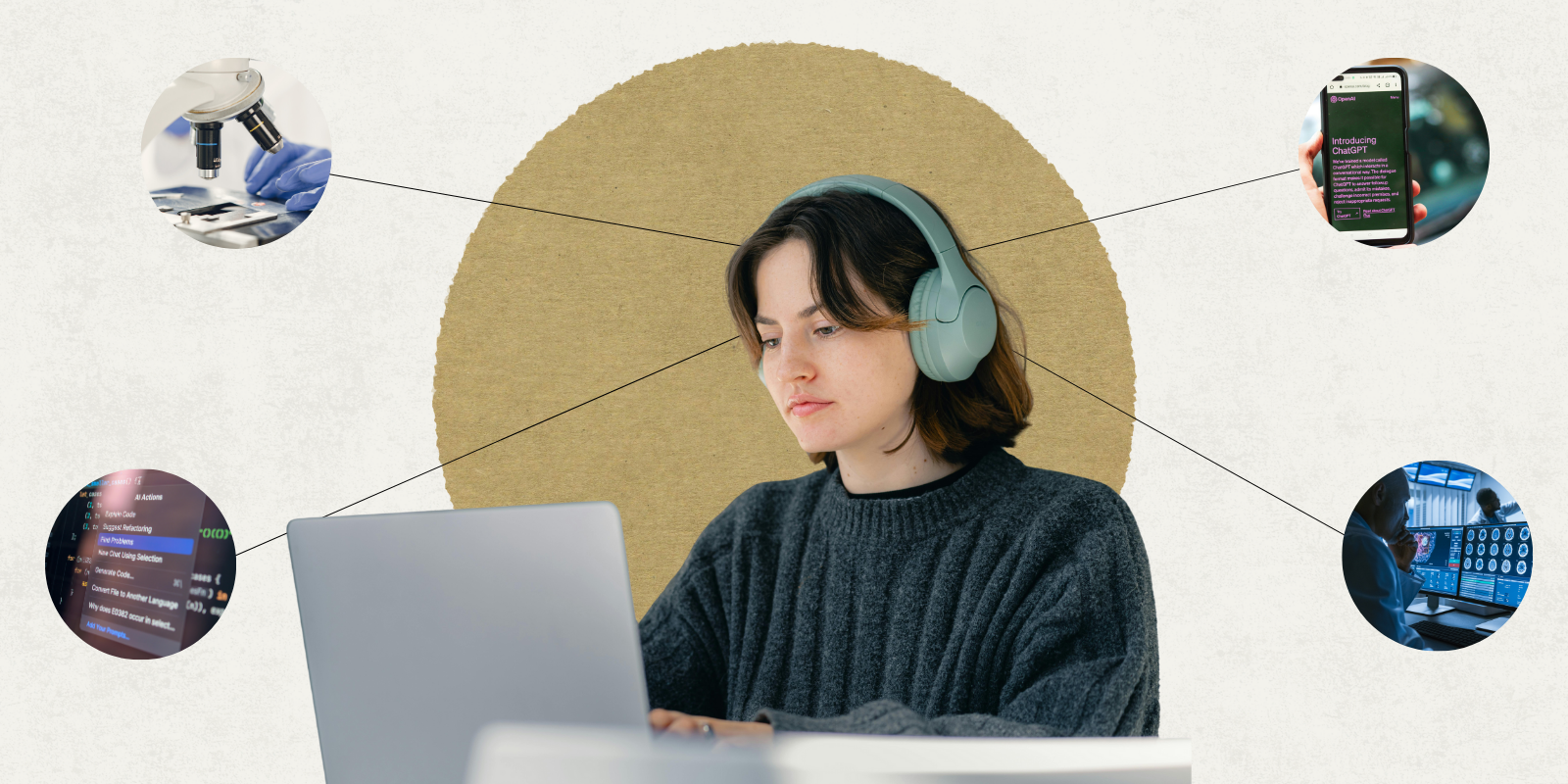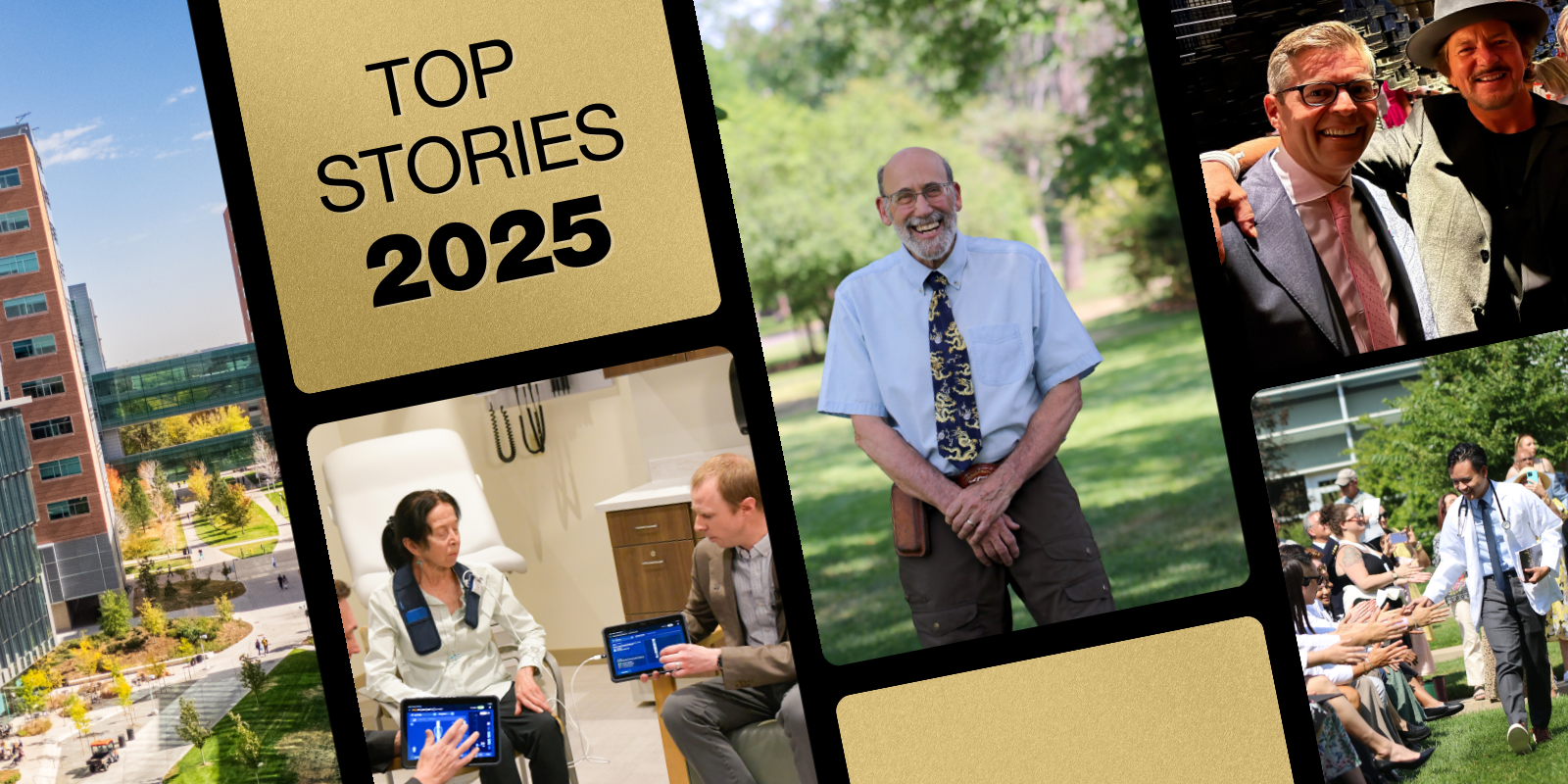Steve Haberkorn knows he’s not the first person to pursue a career in medicine out of a desire to help people. That’s why he did it, though – to help where he can and work to improve people’s lives.
Through his studies in the University of Colorado School of Medicine, he learned how helping often requires empathy. A clinician needs to see things from a patient’s perspective.
So, when he was diagnosed with testicular cancer in January 2019, almost halfway through his medical studies, he embarked on a personal medical journey that at times felt overwhelming and deeply scary. As he prepares to graduate and begin his anesthesiology residency in the CU School of Medicine, three and a half years beyond his anniversary of being cancer-free, he reflects on how his own experiences are making him a better doctor.
“What I went through amplified my empathy and desire to care for the human in front of me and not just the disease,” Haberkorn says. “When I returned to my medical studies and got back into the hospital as a clinician, I felt like I was a better provider having gone through what I did.”
Pursuing a passion for science
Growing up in the Chicago suburbs, Haberkorn always was passionate about science and semi-planned to study physics in college. However, his plans took a big turn when he decided to major in sociology instead at Willamette University in Oregon.
“I loved science, but there was also a different part of me that really cared about social issues and the human side of things that mattered to me,” Haberkorn explains. “Obviously medicine is at the intersection of those things, but it really wasn’t on my radar. Growing up, things came pretty easily to me and I hadn’t yet had to figure out how to work hard for them.”
After graduating he progressed through a series of internships at a think tank, on a local political campaign, and in a U.S. congressman’s office. He finally landed a job in Oregon state government working with a foreclosure prevention program during the Great Recession. He recognized that he cared about good policy and good governance, but it wasn’t his true passion. He found himself wishing he’d pursued a career in science.
His girlfriend at the time – now wife – came from a family of physicians, and Haberkorn’s mother is a nurse, “so I had these great role models and I started thinking I had the ability to do what they’re doing,” he says. “I’d learned how to work hard, and I saw that medicine would be the place where I could work in science and also work with people, directly improving their lives.”
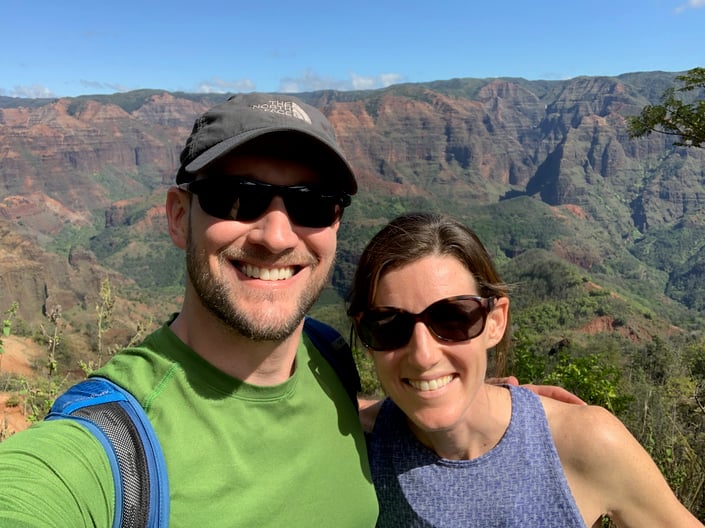
Steve Haberkorn on a hike with his wife, Shannon.
However, he wasn’t at a point of just applying to medical school. In 2012, he began a three-year post-baccalaureate program to take all the pre-med courses he would need, and worked for two years at Oregon Health and Science University as a medical researcher in pulmonary and critical care drug trials.
With that, he felt ready to apply to medical school.
Seeking a diagnosis
In a quirk of timing, the week before Haberkorn began class at the CU School of Medicine in 2017, he and his wife had their first child. “The back story for that is we’d been trying to get pregnant for a year and a half and it wasn’t happening,” he explains. “I was interviewing for medical school at the time, so we said let’s take a pause on trying to get pregnant, and of course that’s when it happened.
“It was a challenging way to start medical school, with two big life changes at the same time, but we were thrilled to have our daughter. And I was absolutely loving medical school.”
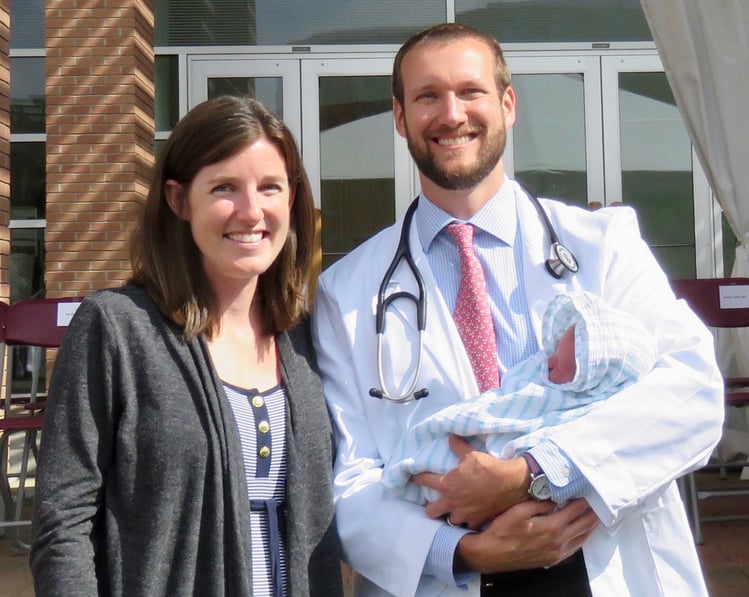
Steve Haberkorn with his wife, Shannon, and week-old daughter, Clara, at his White Coats ceremony in 2017.
But in January 2019, he noticed a firmness in a testicle and, since he didn’t have a primary care physician at the time, he called the oncology department at UCHealth University of Colorado Hospital. He wasn’t able to get an appointment right away, and also learned he needed to work with a primary care physician.
“So, I was having the experience that so many people do, of making calls and trying to figure out what to do next,” Haberkorn says.
A few weeks later, he woke up one morning with a lot of swelling and went to the emergency room, where he received a diagnosis almost immediately. Within a couple of days, he was having surgery to remove the tumor in his testicle. Ironically, the day of his surgery was the day when, had he been attending class, he would have taken an exam on the pathology of testicular cancer.
Unfortunately, a CT scan following his surgery showed that the cancer had metastasized to the lymph nodes of his abdomen. At that point, he was nearing the appointment he originally made when he first felt the firmness in his testicle, and began working with urologic oncologist and CU Cancer Center member Elizabeth Kessler, MD, associate professor of medical oncology in the CU School of Medicine.
While his classmates studied for finals, he began three months of chemotherapy and a leave of absence from school.
A last-option treatment
At the end of that first round of chemotherapy, imaging showed that the tumor in his abdomen had grown and was now invading surrounding organs. He had another surgery to remove the tumor and his left kidney, but follow-up imaging showed a rapid return of cancer throughout his abdomen – all over his liver, a spot or two on his lungs, and filling the space where the tumor previously had been.
While testicular cancer is known for being highly treatable, “mine happened to be very aggressive,” Haberkorn says. At that point, with the cancer not responding to any other treatments, the only option left was high-dose chemotherapy. He knew the odds of it working were less than 50%.
“That was a big mindset shift for me and my whole family,” he says. “We had a lot of conversations about how I could be reaching the end of my life and just kind of grappling with that.”
Through seven arduous weeks in the hospital for two rounds of high-dose chemotherapy, including a week in the ICU following complications, Haberkorn was buoyed by support from not only family and friends, but the CU medical community. He and his wife, whose boundless support he credits for so much of his success, found hope in early signs that the treatment might be working.
A scan following the high-dose chemotherapy showed the treatment had obliterated the cancer.
He took three more months of oral chemotherapy as a sort of insurance policy to make sure any lingering cancer cells were killed. The day he took his last chemotherapy pill, in March 2020, was the day his son was born.
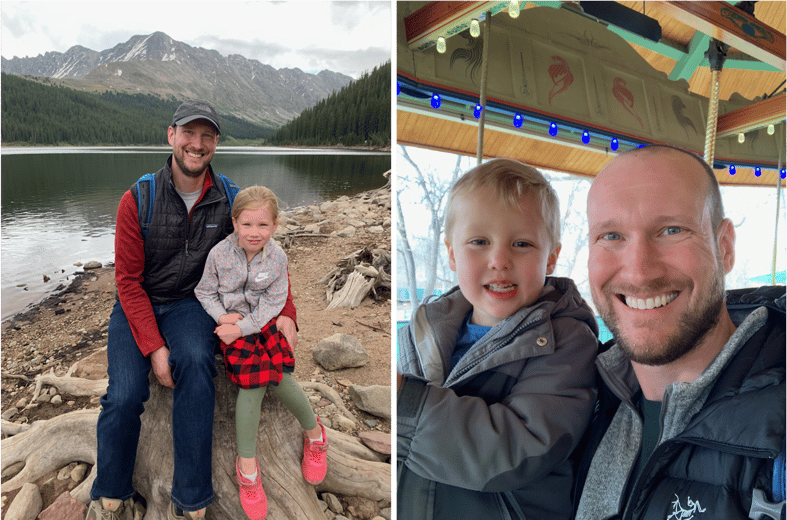
Steve Haberkorn with his daughter, Clara, now 5, and son, Beck, now 3.
“As we were finishing up the initial chemo way back in the beginning, I thought, ‘I’m a medical student, I understand this stuff. I’ll do this chemo, and then I’ll be back in school next year,’” Haberkorn says. “My wife and I were already discussing how we’d be back to normal life soon. We’d wanted a second child and decided this was a good time for it.
“It was a few days after finding out she was pregnant that we found out my cancer wasn’t actually gone and was actually much more aggressive than we originally thought. So, we had to have some really difficult discussions about what she wanted to do, children-wise. Did she want to continue with the pregnancy even though I might not survive? We decided of course she still would love to continue with it, but we never could have anticipated we’d be having to have that conversation.”
“I can be the person they trust”
Haberkorn took another year to recover, heal, and study. He also had to re-do a lifetime of vaccines to compensate for his pummeled immune system. He re-joined medical school in spring of 2021. That extra time allowed him space for reflection and perspective.
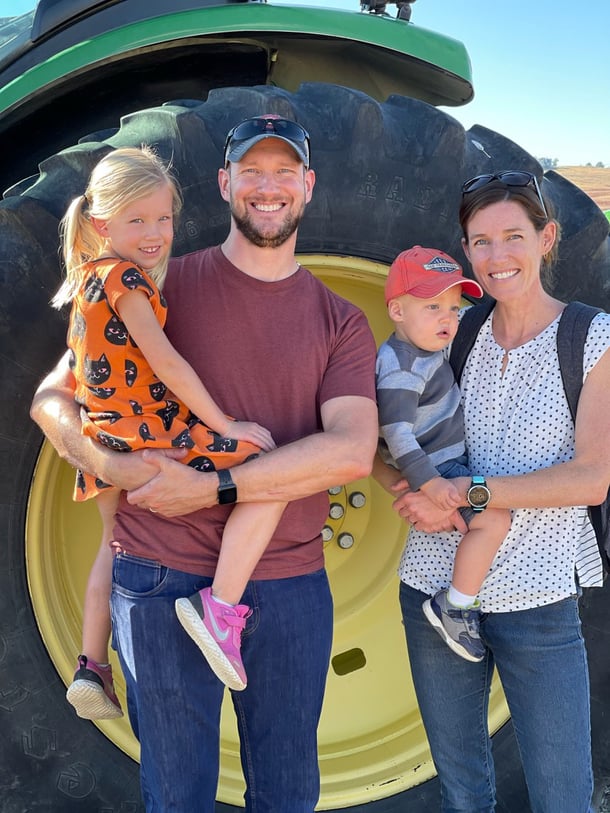
Steve Haberkorn with his wife, Shannon, and children Clara and Beck.
“At first I was interested in the science of it and was looking things up, but as it progressed and my prognosis got worse and worse, I took the opposite mindset,” Haberkorn says. “I trust my doctors. I have an amazing team at CU and Dr. Kessler is a great oncologist, so I trust that I’m receiving the best treatment possible. I realized I didn’t want to look up the statistics – I knew they were bad – and being able to be at a place like CU and have amazing oncologists gave me the ability to not have to worry about the medicine. I could just focus on being a patient.”
He chose to specialize in anesthesiology in part because he loves physiology and pharmacology, and in part because he was inspired by his experience of trusting his doctors.
“A big part of an anesthesiologist’s job is watching over patients and protecting them during this very vulnerable time, when they’re undergoing surgery and their life is in your hands,” Haberkorn says. “Those moments before and after surgery, when patients are often very scared, those are times when I can help reassure them and answer all their questions thoroughly and compassionately. I can be the person they trust in an overwhelming and unfamiliar situation, and I can be the one keeping them safe.”


